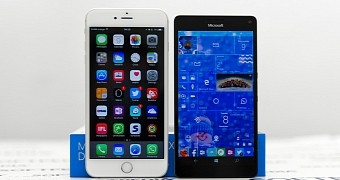Apple, BlackBerry, and the other smartphone manufacturers selling their devices in the United States might soon be forced to install backdoors in their handsets should a newly proposed bill pass through the state assembly.
The bill was first introduced by Assemblyman Matthew Titone in 2015, but was only proposed on January 6, On the Wire reports.
It states that phone makers whose devices are sold in the United States must have a method of providing law enforcement agencies and services with access to user data. The bill concerns devices sold in the US after January 1, 2016, and states that phone manufacturers that do not comply with these requirements would be fined $2,500 (€2,300) for every unit sold.
The anti-terrorism fight
Specifically supposed to support the fight against terrorism and criminals, the bill basically forces phone manufacturers to decrypt their devices and install backdoors that can then be used to access user data should government agencies ask for it.
Apple, which has been one of the main supporters of encrypted devices, has strongly opposed every such law until now, with CEO Tim Cook recently meeting with several White House officials to stand against anti-encryption regulation.
Cook explained in a recent interview that installing backdoors on devices would provide more than government agencies with access to these phones, and user data would be easily exposed. Services such as iMessage and devices including the iPhone feature encryption that cannot be broken right now.
“Here's the situation is on your smartphone today, on your iPhone, there's likely health information, there's financial information. There are intimate conversations with your family, or your co-workers. There's probably business secrets and you should have the ability to protect it,” Tim Cook said.
“And the only way we know how to do that, is to encrypt it. Why is that? It's because if there's a way to get in, then somebody will find the way in. There have been people that suggest that we should have a back door. But the reality is if you put a back door in, that back door's for everybody, for good guys and bad guys.”
Apple’s CEO voiced his opposition in the recent meeting with White House officials, despite being countered by Attorney General Loretta Lynch, who explained that terrorists and criminals turn to encrypted devices to communicate because nobody can access their logs.
“Encrypted devices support criminals”
FBI Director James Comey also said in 2014 that phone encryption was a very dangerous thing for the national security and called for phone makers to provide state agencies with a way to access data stored on absolutely any device.
“Encryption threatens to lead us all to a very, very dark place. The place that this is leading us is one that I would suggest we shouldn’t go without careful thought and public debate,” he said.
The newly proposed bill says pretty much the same thing, explaining that encryption might actually “encourage criminals.”
“The fact is that, although the new software may enhance privacy for some users, it severely hampers law enforcement’s ability to aid victims. All of the evidence contained in smartphones and similar devices will be lost to law enforcement, so long as the criminals take the precaution of protecting their devices with passcodes. Of course they will do so. Simply stated, passcode-protected devices render lawful court orders meaningless and encourage criminals to act with impunity,” the bill states.
The bill still has to make it to the floor calendar and then get voted in the assembly and the senate, but it’ll be interesting to see how phone manufacturers, including Apple, respond should it pass.

 14 DAY TRIAL //
14 DAY TRIAL //